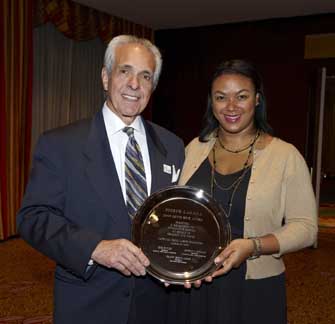See also the HCEF Time Line of Achievement - 1999 to 2012.
From the beginning of his professional life in 1960 as a science teacher in the Penn Hills School District through his retirement as Executive Director of the Allegheny Intermediate Unit and his consequent founding in 1999 of the 501(c)3 organization that became the Homeless Children's Education Fund, Dr. Joseph F. Lagana has understood that — always all about kids,— particularly children who are underserved, underrepresented, abused, neglected, and homeless.
Joe's story is that of a man who saw, who heard, and who did — a man whose professional experiences instilled in him an ever growing awareness of homelessness in Pittsburgh and Allegheny County, Pennsylvania, and more specifically awareness of the effect homelessness has on children's schooling and self-esteem. Out of his awareness came his personal commitment to action and advocacy for social justice.
The next step was a natural one for Joe: the creation of a nonprofit organization devoted not only to raising the general public's awareness of homelessness among children but also to engaging the region's citizenry — from private individuals and community organizations to political figures, corporations, and foundations — in providing direct educational support within 17 residential facilities serving families, support that compliments without duplicating the good work of the Allegheny Intermediate Unit (AIU) as it meets the educational needs of these children. It was this dream that led to the building in 2000 at Womanspace East of the first of now 11 HCEF Learning Centers. It was little more than 3 computers in a large closet, but it was a start.

Quite unconsciously, Joe had been preparing for the founding of HCEF for 40 years. There was no great design. Much was happenstance: being in the right place, meeting the right person, receiving help and encouragement along the way.
With the passage of the Elementary and Secondary School Act in 1965, part of Lyndon Johnson's Great Society, Title I entered the nation's vocabulary and Joe's. For a man who believes the biggest tragedy in life is not reaching one's potential, the opportunity to head the Penn Hills District’s Title I program and make a difference in a child's chance to reach his or her potential was an opportunity to be grasped.
He was headquartered at Lincoln Elementary School in the African-American neighborhood of Penn Hills as Title I Coordinator. At a time of rioting around the issues of segregation across the country, parents tried unsuccessfully to burn down Lincoln School so their children would have to be integrated into a "better" school. Faculty were frightened; parents angry. He called a meeting at which he laid out the collective evidence that Lincoln Elementary had more educational resources than any other in the school district.
Parents, mothers for the most part, did not believe him. The situation calmed but ferment and dissatisfaction continued.
Joe came to understand the need to build trust, to make it possible for the mothers to believe in him. He began seeing them as individuals. Many had had little education themselves. Most were African American. Some were struggling with addictions. Others struggled financially. Some worked two jobs to make it. Others were on the brink of losing their homes. Most likely, but not documented in any way, some moms and their children had experienced homelessness.
He came to respect these women as he recognized that they cared about their children's futures. He convinced them of the importance of children’s daily attendance at school and a group of moms organized a successful "get-to-school" effort. They proudly posted a sign proclaiming "Welcome to Lincoln School! Thank you for getting up! Education is important!"
Joe left Penn Hills in 1969 to become Assistant Superintendent of the North Allegheny School District and then Superintendent of the Northgate School District. In 1982 he became Associate Executive Director of the AIU and so was in position to take responsibility for implementing the original McKinney Act as well as subsequent reauthorizations and amendments—a responsibility that continued to engage him when he became Executive Director in 1992.
One of the things he learned over the years was that Congressional passage of federal mandates does not mean sufficient federal funding to support the state and local costs of implementation. While Joe fought for funding, AIU staff members held frequent small fund raisers.


Skip now to the late 1990's. Joe has begun to think about retiring in 1999. Family and friends are concerned about what he'll do with himself. So is he. There are many suggestions. None fit. In the back of Joe’s mind, though, is the issue of homelessness and children's inherent right to education. He recalls the occasion when two young Black children wander into his AIU office. The children are talkative and full of energy as they explore the room. Their eyes fall on a children's book, and they sit down to leaf through it. Mom is attending an AIU training session on getting the boys into school.
When she comes to collect them, Joe tells the boys they can keep the book. He is struck by the knowledge that this has been his first conversation with a homeless child.
Now, as he contemplates the "what next" of his life, he goes with the AIU Homeless Children Initiative (AIU-HCI) coordinator to an area homeless housing agency. There he encounters one of the boys. The child recognizes Joe as well. He still has the book — no covers, tattered and worn from reading, but a prized possession. It is the only book Joe sees in the facility. Joe begins going with the coordinator to other agencies and again and again finds a very spare environment and unattended children "glued to a television."
The Homeless Children's Education Fund really begins at a 1999 retirement party. Joe wants no gifts, but will accept monetary contributions toward creation of a fund the AIU-HCI coordinator can draw on for the emergency educational needs of homeless kids. The $7000 received that evening is deposited in the name of the Homeless Children and Family Emergency Fund (HCFEF), and the 501(c)3 organization that Joe has been dreaming of is about to become a reality.
Around this same time the area’s Representative to Congress Bill Coyne, a long-time friend of Joe’s, asks Joe about his post-retirement activities and wonders if Joe knows about the McKinney Act. "Yes, I've been responsible for overseeing it at AIU. And doing so with little federal money. Appropriations have been inadequate because there has been no demand for them within Congress." Coyne's response? Write something up for the next budget and I'll take it to the floor of the House.
It's now 2001. George W. Bush is promoting "No Child Left Behind." The National Association for the Education of Homeless Children and Youth is generating a major campaign for the reauthorization and strengthening of the McKinney-Vento Act. Clearly the time for collaborative advocacy for the educational rights of homeless children is now. A Pittsburgh friend puts Joe in touch with Senator Arlen Spector. Spector in the Senate and Coyne in the House successfully lobby with colleagues for reauthorization of McKinney-Vento, which ultimately defines No Child Left Behind legislation.

HCEF is committed to ensuring that children who are homeless have access to the same educational opportunities and experiences as their peers. It focuses on providing "hope through learning" by
- raising public awareness of the very existence of children's homelessness and the concomitant challenges to their academic success
- providing enhancements to and support of learning within transitional and bridge housing as well as emergency shelters
- offering multiple opportunities for adults, youths, and children to becomes advocates for families experiencing homelessness and the educational rights of the children affected
What people contribute their time, talents, and treasure to is what they come to be knowledgeable about and advocates for. HCEF gives people that opportunity. 100% of all individual contributions to HCEF support yearly-awarded Mini-Grants for Educational Innovation that directly enhance learning opportunities within the housing agencies. Since 2002, nearly $200,000 has been awarded in Mini-Grants and Educational Field Trip transportation support. Only the fund's interest income is used, thus guaranteeing funding in perpetuity for innovative programming aimed at educating homeless children.

Pittsburgh area businesses, foundations, state and federal representatives and senators have likewise generously funded HCEF’s mission, making possible agency-based Learning Centers with computers and peripheral equipment; Resource Libraries with books and educational software for every age, every reading level; and workshops for agency staff members on such topics as bullying, health issues, and using art and storytelling with children.
Joe has been called a community activist who "gets it." He knows through first-hand experience that awareness of the effects of homelessness on children's opportunities to reach their potential begets action in response to specific needs, begets advocacy for change, begets children who discover there IS hope through learning.
The National Child Labor Committee, headquartered in New York City, awarded Joe its prestigious 2009 Lewis Hine Award for "exceptional work on behalf of the health, education, and welfare of children and youth, particularly those at risk."

In 2007 he was honored with the National Association for the Education of Homeless Children and Youth's (NAEHCY) Sandra Neese Lifetime Achievement Award.
"We have made a difference in the learning potential of kids for over a decade. By providing our services in the 'homes' of our kids, we have overcome one of many barriers," notes Joe. "But, other significant barriers persist. In order for transient youths or children in homeless families to truly have equal access to their same educational opportunities and experiences as their peers, school districts need to be acutely aware of and to ensure their lawful educational civil rights."
(updated 02.03.2014)
Top of page